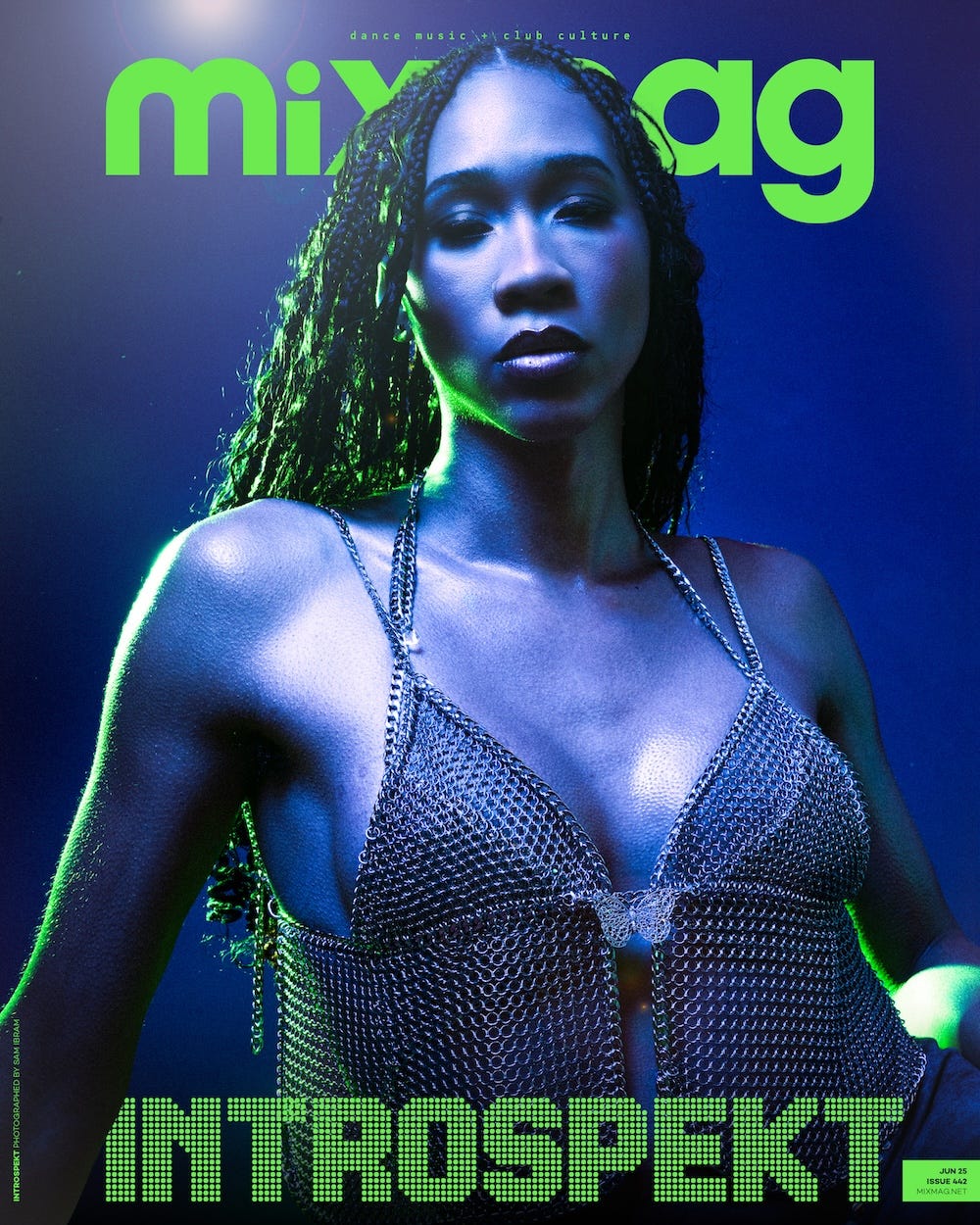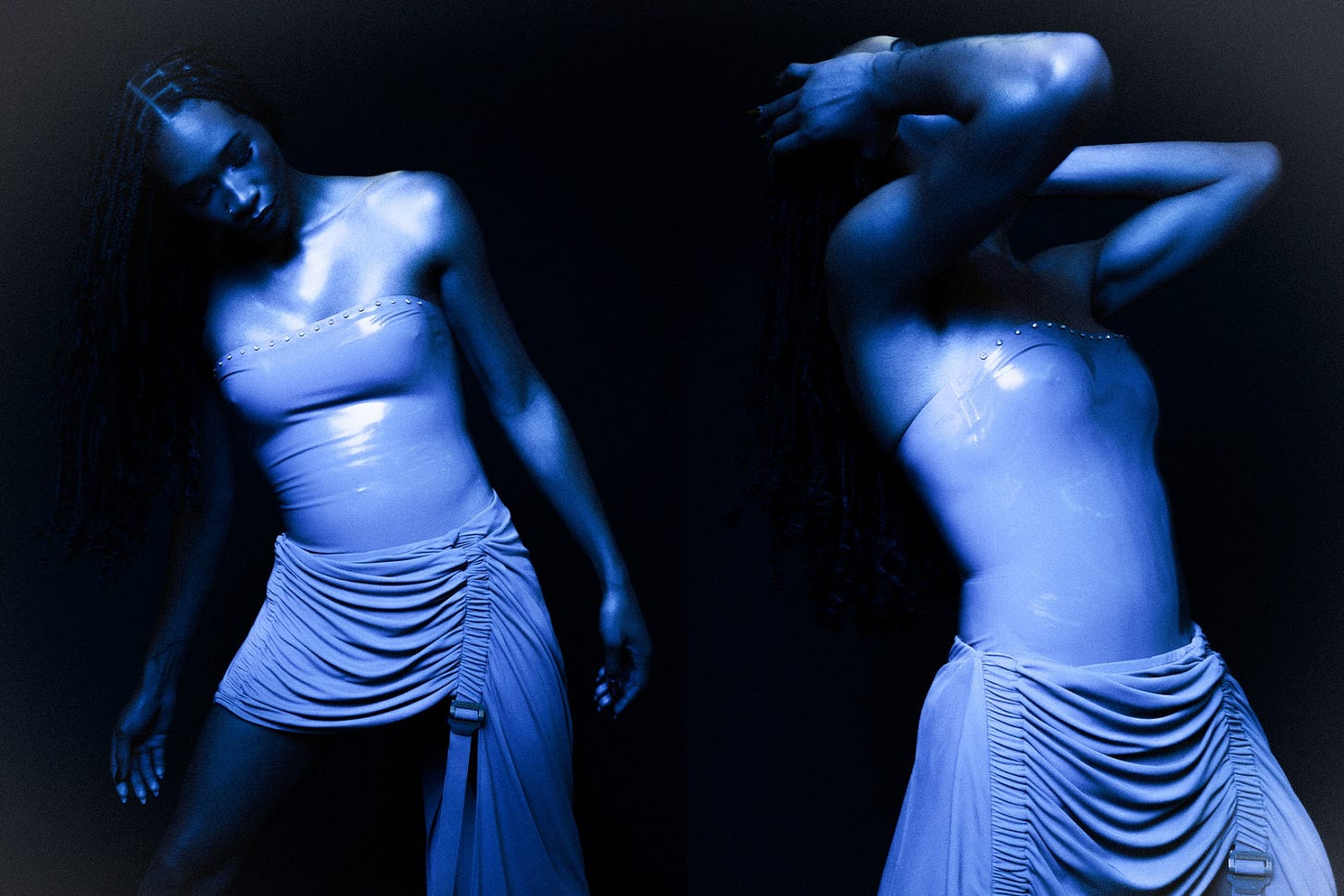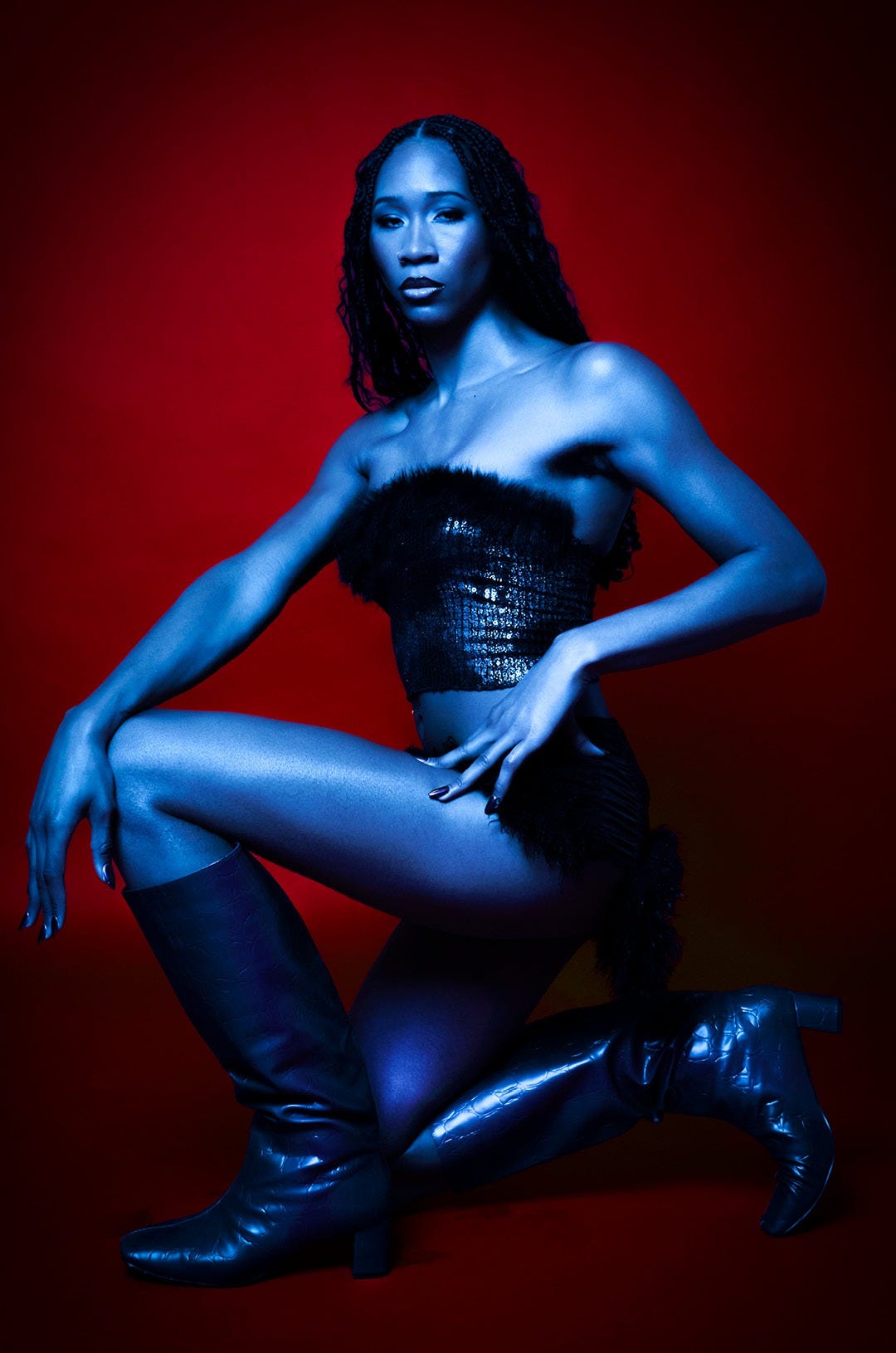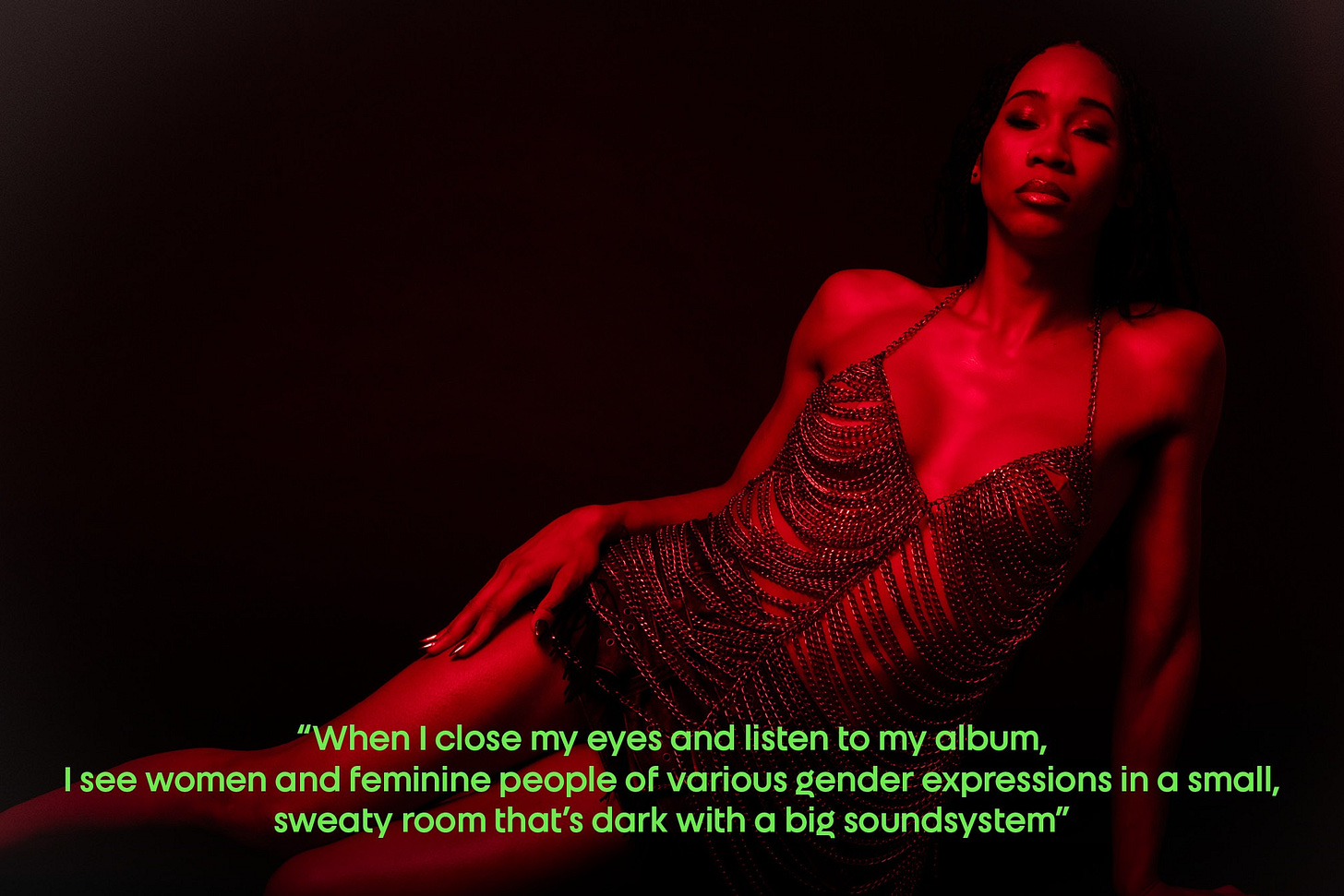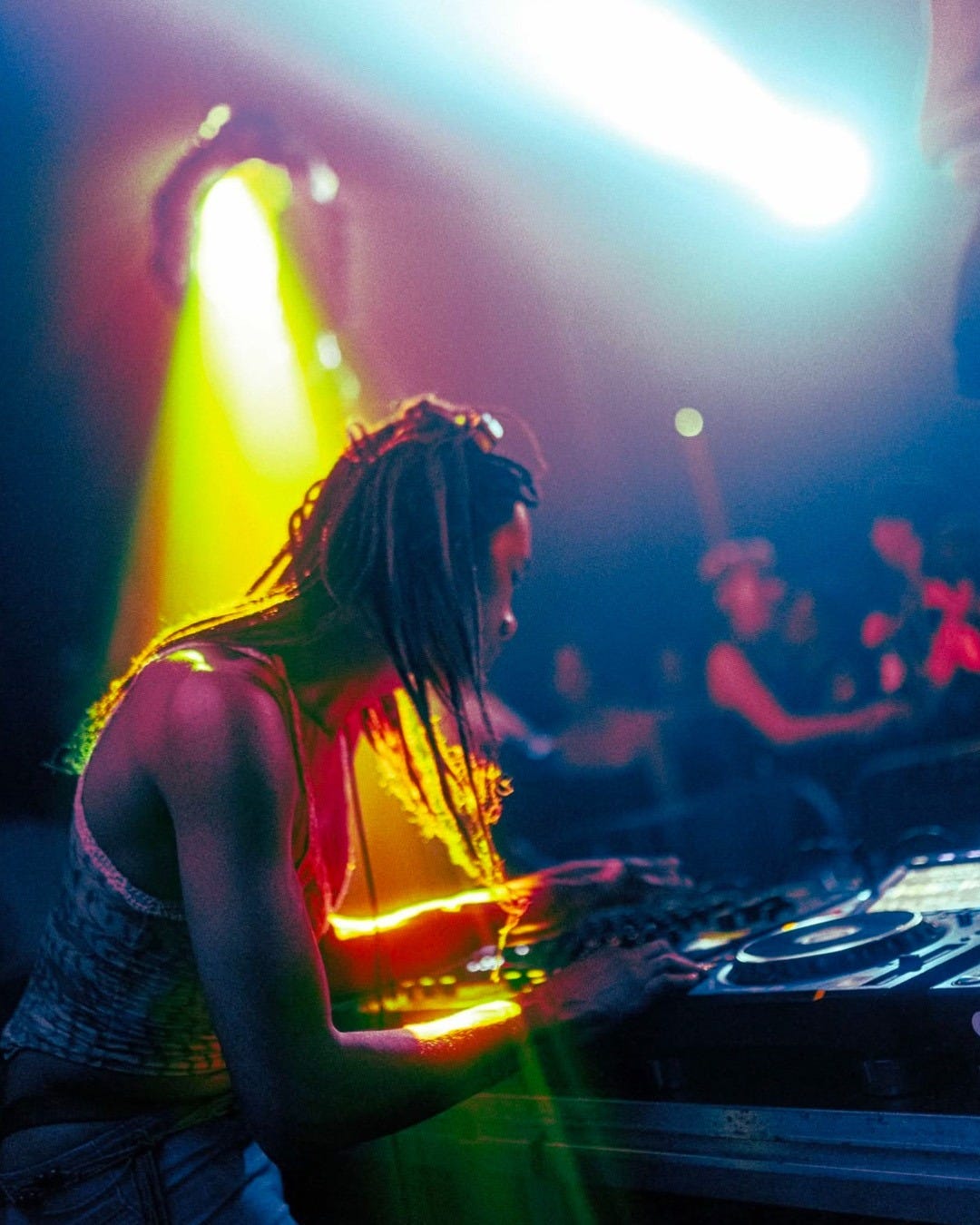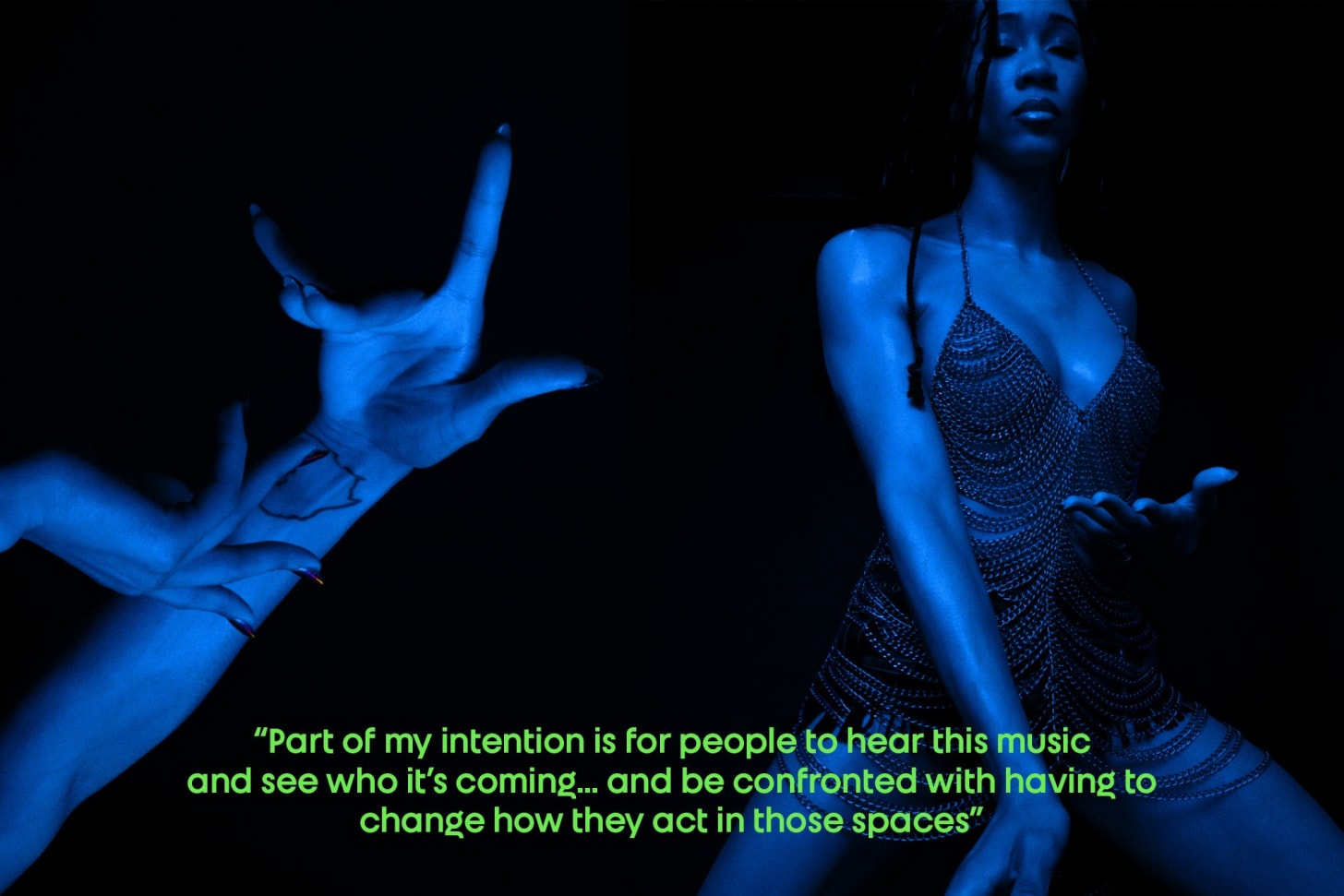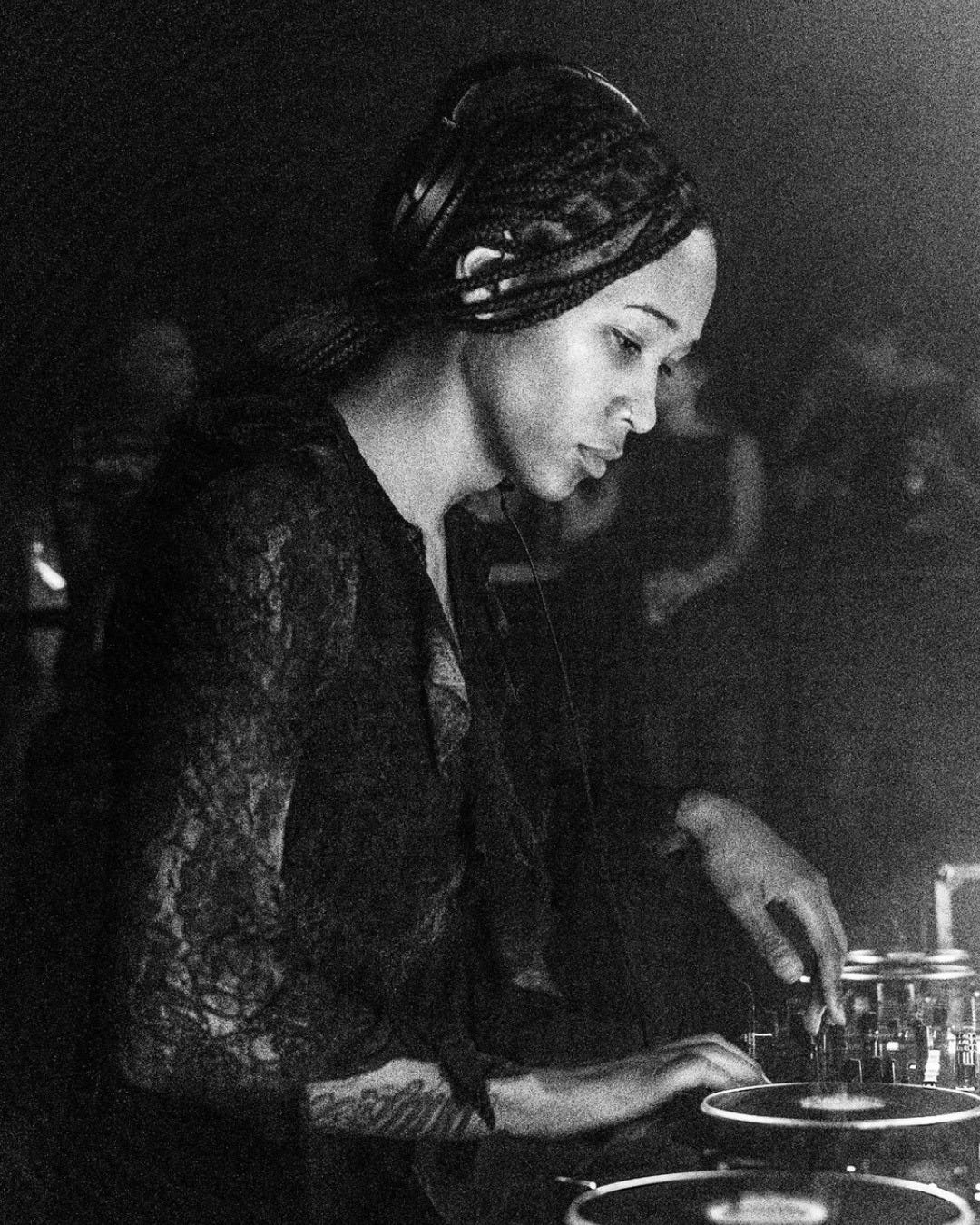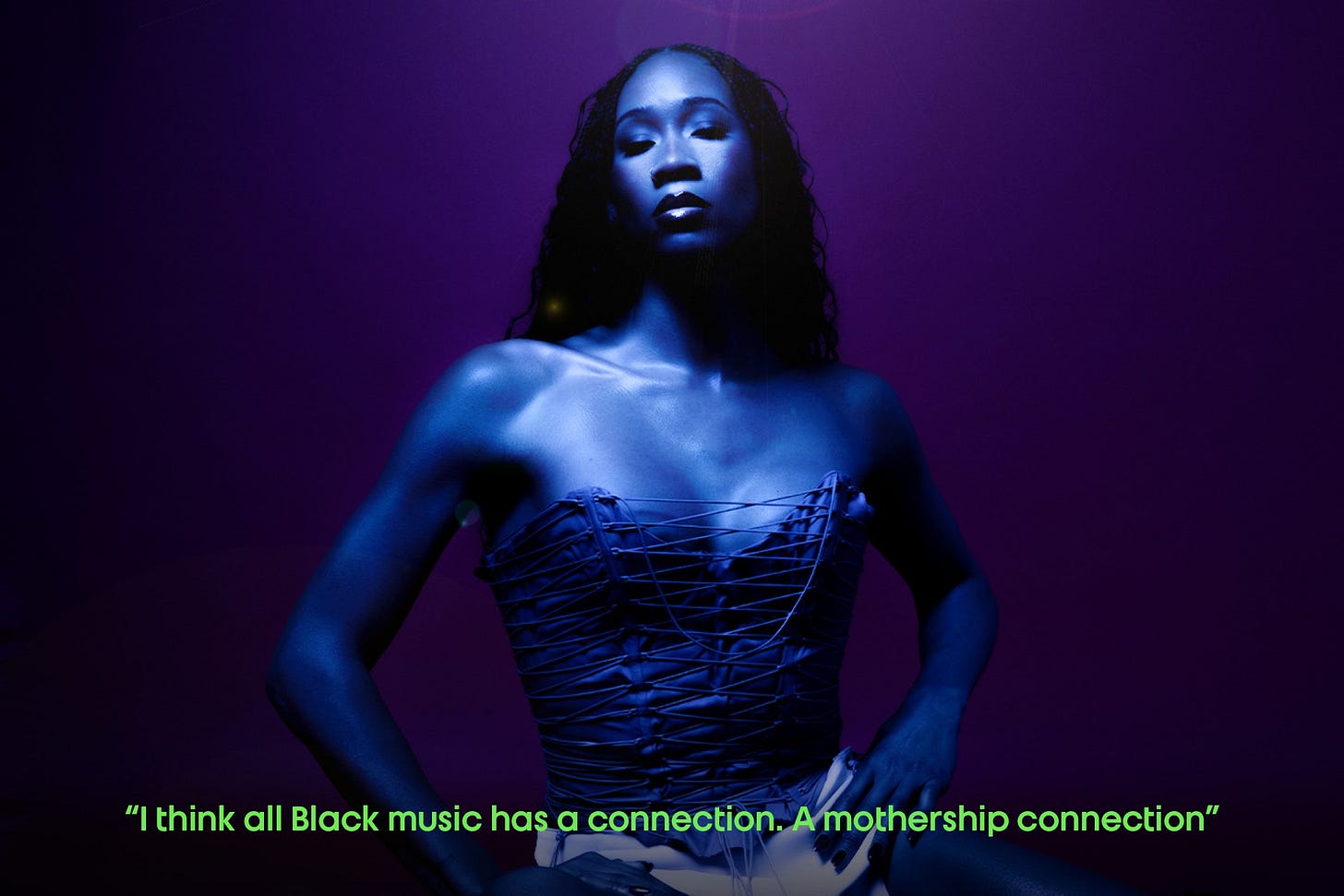Introspekt is the protagonist of soundsystem music's femme-forward future
For Mixmag's latest cover story, I sat down with LA-raised, New York-based artist Introspekt ahead of her debut album, 'Moving The Center,' out June 20th on Tempa.
This story was originally published as Mixmag’s latest cover feature.
"When I close my eyes, I see women and feminine people of various gender expressions in a small, sweaty, dark room with a big soundsystem," Introspekt visualises. "Everyone's grinding and kissing each other. It's a space of sensual exploration."
That's the intimate, titillating world Introspekt has been soundtracking through her provocative bass-driven experimentations over the last decade, and her vision becomes fully formed in her debut album, 'Moving The Center', which arrives on June 20 via legacy UK dubstep and garage label Tempa. Her vision is reminiscent of the first time she played in New York City, the place she now calls home.
"It was a special night," she remembers. Taking place in the middle of winter, January 2023, party and record label Twist brought her to the East Coast for her NYC debut at Mood Ring. The cozy bar-slash-club in the heart of Bushwick is a local stomping ground known for giving independent promoters the opportunity to grow their parties and providing a platform for emerging DJs to premiere in a prime nightlife hotspot. "It was an interesting one. Very diverse. It made me be like, 'Yeah, I fuck with New York for that.' I love those parties where it's a bunch of cool people who wouldn't normally be in the same room."
It's only right that we're now conducting our interview inside of Mood Ring, the venue that introduced her to the city's eclectic and open-minded nightlife scene in the first place. "There weren't too many people recording on their phones," she says, comparing her time on both coasts. "LA just doesn't have the same kind of infrastructure for clubbing that New York does, so seeing a bunch of people in a club, partying, having fun… it was fucking sick. I hadn't really experienced it like that before."
As a young, transsexual woman in Los Angeles, Introspekt felt like her only career options were in visual-oriented entertainment, like modeling, acting, influencing, and sex work-related jobs — but music is her primary passion. She found that the city's electronic music scene lacked opportunities for the underground, especially compared to New York. "I had my first few DJ bookings in New York City and really connected with the community," she says. "So I decided to start making plans to move there." By the end of the year, she switched coasts.
Introspekt was born and raised in Leimert Park, a neighborhood in southern Los Angeles adorned with Spanish Colonial homes paved by streets studded with lush greenery. In 1998, the Los Angeles Times called it the "cultural heartbeat of Black Los Angeles." The locality was once home to artists like Ray Charles and Ella Fitzgerald—Black jazz innovators who Introspekt would consider some of "the most groundbreaking music theorists."
Jazz was just one of many types of music Introspekt would listen to in the car with her parents. Her mom's music taste was eclectic; she listened to funk, soul, gospel, and hip hop — genres that not only built the basis for electronic music, but would also ultimately influence Introspekt's scattered sound and love for musical variety. In her younger years, Introspekt would listen to everything from rock bands like Rage Against the Machine and The Sleeping to rappers such as Tupac and Wu-Tang Clan. "I was really into music with sociopolitical themes," she explains. "Music that dealt with feelings of alienation in an individual sense and a broader societal sort of way."
Somewhere between the ages of eight and 10 years old, Introspekt's mom found her playing ‘Lean on Me’ by Bill Withers on her brother's toy keyboard. Her mom was shocked at her ability to pick up the skill by ear and immediately bought her piano lessons. She stopped taking the classes shortly after for reasons she can't remember. But in 2012, Introspekt went to a thrift store in Westwood, near a record store called Touch Vinyl that was owned by someone she knew through martial arts. She found a PlayStation 1 with a video game and music sequencer program called Music 2000 and took it home, beginning her journey into music production.
Around the time she started honing her skills in a Southern Chinese form of Daoist Kung Fu called Qigong, she also began learning how to DJ vinyl at Touch Vinyl's open decks. In a way, both art forms were training her to develop the body, mind, character, and soul — and the mindfulness exercises she practiced in both activities would go on to inform her creative process. "I guess it has influenced my worldview as it relates to music," Introspekt connects, "So much of martial arts is philosophical and is based around ideas of rhythm and timing." Practicing these concepts turned out to be useful in cultivating her distinctly unpredictable DJ technique. Her impressive flirtations with a mishmash of moods, genres, and BPMs have led to a residency on NTS, bookings at iconic festivals and club nights like dweller, Draaimolen and FWD>>, landing a spot on Mixmag's 2023 list of breakthrough DJs of the year.
"I used to plan my sets out a lot, but I recently adopted that orientation of improvisation," she says of her evolving approach. "I got my records, I turn up to the club, I'm just gonna play what I'm called to play in whatever order."
Trusting her intuition is also what keeps her productions fresh and unconventional. Introspekt isn't formally trained, but she has a deep appreciation for music theory and music history. After all, you have to learn the rules before you can break them — and breaking the rules is what Introspekt aims to do.
In 2015, Introspekt performed at Hollywood club King King for a B-Side party featuring Dark Tantrums, Kaiju, Joe Nice, and Indica. She was immediately kicked out of the club after performing because she was underaged. "All I remember from the night is arriving at the club and being rushed past security by my buddies who were the promoters," she reminisces. "I opened up the room and played a few acetate dubplates and vinyl records to a crowd of maybe three people and was told I had to leave, but could hang outside. My mom was real pissed when I got home at 3:AM." 10 years later, she carries that rebellious spirit forward, disrupting dance music's persistently white male-dominated spaces and reshaping its sound at the same time.
But Introspekt took a break for a few years first. She had been dealing with depression and suicidality, but reached a turning point in 2019. "I had a moment where, for the first time, I vocalized to someone that I wanted to transition," she says. "I don't think it can be boiled down to one moment, though, really. It's just a feeling that's been there, you know? But I didn't have the language for it until then." Accepting herself emotionally, psychologically, and physically brought her back to releasing music. "I finally felt comfortable enough in myself to share myself with the world."
A deep dive into Introspekt's SoundCloud will dig up decade-old rattling dubstep and grime cuts (à la Coki), but her return showcased a sound much closer to her first touchpoints in electronic music — employing the influence of Jamaican audio engineer King Tubby's echoing samples and Baltimore Club's bounce which family in Maryland had introduced her to. By 2022, her playful dubstep and club-infused garage productions made their way to the UK, getting signed to labels like Practical Rhythms, ec2a, Gimme A Break Records, and Breaks 'N' Pieces. The following year, she released EPs on prominent labels including Shall Not Fade's Timeisnow and Eris Drew and Octo Octa imprint T4T LUV NRG.
Through experimentations with the UK garage sound, Introspekt recontextualizes it in a way that reprioritizes Black, queer, and femme perspectives in dance music. "One of the biggest meta narrative themes of the album is the idea that sometimes the form which something inhabits is not really reflective of its essence," she explains. "I definitely think that the spirit, the soul, of the tracks is very different from what's kind of being captured in modern UK garage."
Introspekt is still defining the contrasting yet connected concepts of form and essence, and how these ideas relate to her craft. For instance, while 'Moving The Center' utilises garage's foundational two-step rhythms throughout its entirety, it can't rightly be categorised as a garage album, with further sonic and thematic exploration that makes it much more.
"In my thinking—informed by my maternal cultural background, training in Qigong, and experience of gender and embodied sex transition—there's a complex relationship between form and essence," Introspekt explains. "The relationship is marked, partially, by difference, but also by a dynamic unity structured via a shared point of origin."
"In other words, that which is nameable, visually observable, or superficially apparent, only constitutes one side of things," she continues. "The more enigmatic, essential side of things — while not to be confused as the singularly important aspect — is another side that I feel must be given consideration."
Two-step's characteristic syncopated kicks are one identifiable mark of 'Moving The Center', but the album additionally embodies the grittiness of dubstep, the sexiness of East Coast Club music, the spaciousness of dancehall, the Afrofuturism of Detroit techno, and more. It goes beyond the garage sound that has become synonymous with Introspekt and instead presents her as an alchemist who transforms these genres into a sonic synthesis of Black music from around the world.
"I think all Black music in general has that mothership connection," she says, referencing Parliament's seminal 1975 record. "It's really about that Afrofuturist idea of taking all of our accumulated knowledge and life worlds and projecting it into the future of music."
With 'Moving The Center,' Introspekt will also be the first woman to release an album on Tempa in its 25 years of operation, joining a lineage of debuts from dubstep legends like Skream and Benga. While she acknowledges Tempa hasn't always been a femme-focused label, she also points out that there are aspects that still put women at the forefront. "You know, when a producer is thinking, 'What'll get the girls on the dancefloor?', that becomes an expression of femininity, or at least a feminine-centered sensibility."
That mindset rings true in Tempa's discography. Even digging into the label's first release, two-sided single "When You Hold Me / Let’s Dance" by Horsepower Productions, both cuts are playful garage tunes meant to get bodies moving on the dancefloor rather than just seeking approving nods from heady voyeurs.
A comparable observation can be made about East Coast club music. While the scene has traditionally been reigned by men, its woman-centered undertones can't be ignored. In 'Moving The Center,' Introspekt harnesses the power of Baltimore's distinctive breathy moans and buoyant kicks to give the record a provocative edge that reasserts its hedonistic motif.
"I wanted to make something that I felt was representative of the aspects of dance music and bass music I've always been drawn to," Introspekt said. "The aspects that attracted me to it: the sexiness, the sensuality, and the physicality of it."
But 'Moving The Center' isn't just about debauchery and escapism; it also acknowledges the harsh reality that there is something to escape from. Women, Black people, and queer folks have to face battles every day — and those truths aren't overlooked in the project. The record starts with ‘The Transmission’, a moody track overloaded with whipping claps and sinking synths that mimics the undeniable tension in and out of dance music.
"I feel like dance music is obsessed with men right now," Introspekt says. "The dance music world is so patriarchal. It even feels like a woman who produces has to feature a bunch of men to get ahead. At every turn, it feels like you have to inject the sensibility of men into the music or curation of an event. I feel like so much of it revolves around what will make men happy."
The times that Intospekt's crowds are often largely made up of cis, straight men doesn't go unnoticed by her. "There's obviously some kind of weird class, gender, race thing happening here where this music is putting me in these spaces," Introspekt reflects. "It feels uncomfortable and unsafe for me. A big part of [this album] was considering the socio-political content of the music—not in an obvious way, but more about what sounds and rhythms appeal to what people."
Introspekt feels worlds apart from what she interprets as posh university student's "heterosexual mating rituals" at raves. "I think the reasons I go out [when I'm not performing] have slightly more to do with the general experience of sound as it relates to my vibrationally-attuned practice," she says. "Lately, I'm revisiting the memories of my early days raving as a youth and how they were experienced in relation to my training in Qigong."
On the other hand, Introspekt understands that there's still a portion of her fanbase that is made up of that demographic. "Part of my intention is for those people to hear this music and see who it's coming from and go into these spaces where femme- and Black-centered values are at the forefront, and be confronted with having to change how they act in those spaces."
She recalls a night at London club fabric, where she played out 'Afro Bass' — the second track off the album — for the first time. "It cleared the floor," she recalls. "I was like, 'Damn, people are not fucking with this.' But then, I looked up and I realized everyone walking out were a bunch of straight, white guys. I looked over to my right and there was this lesbian couple hella making out. That's exactly what I want this track to do: Clear the room of all the bros and [make] all the girls kiss."
In 'Moving The Center', Introspekt isn't just asserting her role as one of dance music's foremost femme protagonists, she's also reconnecting and recontextualizing the genre's Black origins. The album challenges the state of the scene's current social dynamics and pushes a global sonic revolution — one where women lead the way.
'Moving The Center' is out June 20 via Tempa, pre-order it here



